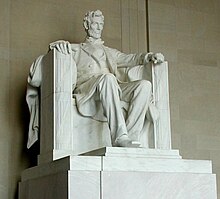Heather Cox Richardson
American historian
Heather Cox Richardson is Professor of History at Boston College and President of the Boston University Historical Society.


| This article about a historian is a stub. You can help out with Wikiquote by expanding it! |
Quotes
edit- The Republicans had fielded an army and navy of more than 2.5 million men, had invented national banking, currency, and taxation, had provided schools and homes for poor Americans, and had freed the country's four million slaves.
- To Make Men Free: A History of the Republican Party (2014), p. ix
- Republicans have taken the stand that economic opportunity is central to the American ideal and that it is the government's responsibility to make it possible for everyone to rise.
- To Make Men Free: A History of the Republican Party (2014), p. ix
- The history of the Republican Party is marked by vacillation between its founding principle of opportunity and its domination by the wealthy elite. The party came together in the 1850s in opposition to the wealthy slaveholders who controlled the federal government. Democrats acting on their behalf insisted that America’s primary principle was the Constitution's protection of property, and they pushed legislation to let planters monopolize the country’s resources at the expense of the working. ... Abraham Lincoln and others recoiled from the idea of government as a prop for the rich. In organizing the Republican Party, they highlighted the equality of opportunity promised in the Declaration of Independence and warned that a healthy economy depended on widespread prosperity. Northerners and hardscrabble Westerners flocked to that vision, and elected Lincoln to the White House in 1860.
- "Bring Back the Party of Lincoln" (3 September 2014), The New York Times, New York
- The Republican Party is part of a larger American discussion about the tension between equality of opportunity and protection of property, which is sort of the point of the book, that this is a much larger American discussion, and Republicans began under Lincoln with the attempt to turn the discrepancy between the Declaration of Independence and the Constitution into, at the time, a modern-day political solution. The Republican Party would manage, they hoped, to turn the principle of the Declaration of Independence, that everybody should have equality of opportunity, into a political reality. The Declaration of Independence was, of course, a set of principles; it wasn't any kind of law or codification of those principles. The Constitution went ahead and codified that the central idea of America was the protection of property, so the Republicans began with the idea that they would be the political arm of the Declaration of Independence's equality of opportunity. Throughout their history, three times now, they have swung from that pole through a sort of racist and xenophobic backlash against that principle, tied themselves to big business, and come out protecting the other American principle, which is the protection of property. That tension between equality of opportunity and the protection of property, both of which are central tenets of America, played out in the Republican Party.
- as quoted in "'Not the true Republican Party': How the party of Lincoln ended up with Ted Cruz" (29 September 2014), by Elias Isquith, Salon
External links
edit- Encyclopedic article on Heather Cox Richardson on Wikipedia